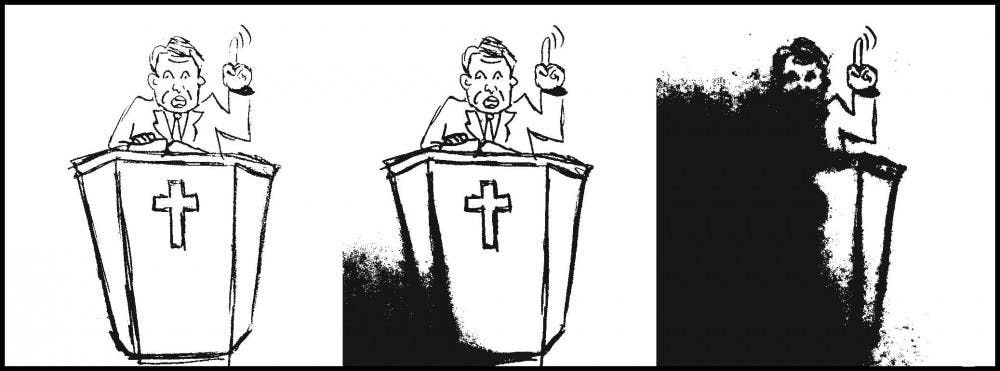On June 12, Pulse, a gay club in Orlando, Florida, became a crime scene overnight in what was the United States’ 177th mass shooting this year. The shooter killed 49 people and wounded 53, making it the largest mass public shooting in U.S. history.
The next morning, Pastor Steven Anderson of Tempe’s Faithful Word Baptist Church uploaded a video response, sharing his thoughts of the shooting.
In a no-holds-barred video, Anderson expresses what he felt was the "good news" and "bad news" about that night: "bad news" being that the shooter was stopped quickly and the "good news" was that 49 people — or "pedophiles," as he called them — were dead.
In the video, he proudly declares, “there’s 50 less pedophiles in this world,” then refers to the dead as “reprobates” and a “bunch of disgusting perverts and pedophiles.”
He then delivers us his two pieces of “bad news:” one, that the incident will be used for political play, and two, that the surviving “homos” will “continue to molest children and recruit people into their filthy, homosexual lifestyle.”
While delivering the bad news, Anderson predicts politicians will push harder for gun control legislation and an agenda against hate speech, fearing that “Bible-believing Christians” who “preach what the Bible says” will be the next to be “attacked” by propaganda of some sort and labeled as religious extremists.
Then he tops that statement by entertaining his idea of a “righteous government,” that executes homosexuals for being homosexuals. He prefaces his proposal for such a state by carefully explaining that he doesn’t believe in vigilantism.
Screenshot from Steven Anderson's video
“I wouldn’t take things into my own hands or become a vigilante, but I will say this, you know, the Bible says that homosexuals should be put to death in Leviticus 20:13,” he says.
“They should have been executed by a righteous government that would have, you know, that would have tried them, convicted them and saw them executed. Because in Leviticus 20:13, God’s perfect law, he put the death penalty on murder and he also put the death penalty on homosexuality. That’s what the Bible says, plain and simple.”
Throughout the video, Anderson appears almost bored talking about it, he speaks in a detached tone and the language he uses is demeaning and disrespectful to the dead and injured.
YouTube later removed the video for violating its hate speech policy. But this isn’t the first time Mr. Anderson has received attention for his controversial views. He has quite the collection of controversial views.
In the past, Anderson has renounced Judaism and Islam, insulted Caitlyn Jenner along with the transgender and LGBT community, says 9/11 was an "inside job," blamed the victims of the Paris attacks for their own deaths, called for the death of President Obama and denies that 6 million Jews died during the Holocaust.
The August sun is beaming down on us as we arrive to Faithful Word Baptist Church, but at least it’s not as hot as the eternal hell Anderson believes we are headed to. Chris Wood, State Press columnist, is my second pair of eyes and ears for Pastor Anderson’s sermon today.
Faithful Word is off of Southern Avenue and 48th Street in a business lot, neighboring a family healthcare clinic and a Wendy’s. From the outside, it looks like an office space — the parking lot is clean and cars file in one by one.
Inside, it looks like any other church service, sans crucifix and images of biblical figures. Church regulars make up a live band that performs in front of a wall painted with a scene from a peaceful, green valley with hills in the distance.
It fits the place, really. In order to rationalize what Anderson preaches, you have to transport yourself to a fictional place. His message just doesn’t seem to fit in the real world. The rest of the walls are mostly blank — you know where your attention should be directed.
Sitting around me are mostly white families: men in uniform, women in modest, below-the-knee dresses, bored children in fancy clothes. Almost every seat was occupied by the start of the service.
I look at the church pamphlet, which lists figures such as the monthly donation count: $21,817.48 in total tithes and offerings.
Four members of the church are openly carrying a sidearm for security, according to Anderson. He says he believes guns have been a deterrent to any “problems” the church may face — although there have been none.
Photo by Chris Wood | The State Press
Anderson is in the middle of delivering his sermon about learning from the mistakes of others and applying those lessons in hopes of living a better life. He says the United States should learn from the mistakes of “godless” countries such as Japan, citing its steady population drop and pointing out the Biblical significance.
Citing a fraction of Genesis 1:28, “And God said to them, 'Be fruitful and multiply and fill the earth…,'" Anderson argues that Japan’s government-issued “Two-Child Policy” goes against this scripture and that God is punishing them for not having enough sex and kids.
So how is God punishing Japan? One way, according to the pastor, is by the growing popularity of a subculture known as Hikikomori, a group of young adult Japanese men who isolate themselves from the outside world and withdrawal from social contact to live on the Internet.
How does this relate to America? According to Anderson, kids who play an extensive amount of video games classify as an American hikikomori. If these children continue to be hopelessly addicted to video games, Anderson believes the people of America would be punished similarly to Japan: lower birthrates, a decreased population, a dramatic shift in the traditional family unit, etc.
Photo by Chris Wood | The State Press
For a man who says to “not hate anyone,” he is very adept at using language to put others he disapproves of below him in a moral sense.
All of the action wasn’t on Anderson’s stage, a lot of it was in the background. During the sermon, parents would take their misbehaving child to a room in the back to spank them with a wooden spoon.
This made me wonder about their family life: if casual spanking of children at church is acceptable, what other type of punishment is permission in "God's eyes?" What else do we not see or fail to notice?
The sermon ends and Anderson dismisses the congregation. He greets Chris and I and escorts us to a closet office in the back. Anderson is sporting a pit-stained dress shirt, tie and slacks. As passionate of a preacher as he is, it doesn’t surprise me that he’s a little drenched. You try yelling at people for an hour.
Anderson points out the shelves full of boxes of films that surround us, or "documentaries," as he calls them. The pastor has produced five feature films with Paul Wittenberger, a former production crew member in Hollywood. Wittenberger saw Anderson’s online sermons, contacted him about making films and the rest is history.
(In 2012, the pair produced “After the Tribulation,” a film that describes Satan’s plan to work behind the scenes of the government, set up a new world order, bring about the Antichrist and begin the apocalypse. Really.)
Photo by Chris Wood | The State Press
He explains why he doesn’t care what people think of him and his views. In short, Anderson believes that the reason he is hated is because the people who hate him haven’t read the Bible cover to cover, and thus don’t fully understand it and are simply afraid of the truth.
Anderson then doubles down and blames pastors for misleading Christians by ignoring the “bad parts” of the Bible.
“It’s the pastors that are cherry-picking,” he declares. “They know what (the Bible) says and they choose to preach only sweetness and light and then they give a really warped view to the church members. There’s tons of scripture to support hate, anger, praying against someone, but it’s just Christians don’t know that and they flip out.”
The anger of others gives Anderson reassurance that what he is doing he is right. Finally, I reach the topic that brought me here in the first place: the Orlando Shooting.
The conversation starts out light, after I ask him why his rant was removed from YouTube.
“Yeah, something with hate speech,” he replies, almost annoyed to be reminded.
When I ask how he defines hate speech, he replies in an almost condescending manner.
“I don’t believe in such a concept, the whole term is stupid," he says. “It’s just a trendy buzzword. Human beings have a natural spectrum of emotion — love, hate, anger, sadness, happiness — all of these are normal and natural and none of them are sinful in their proper place.”
Even months later, Anderson says he feels justified in rejoicing over the deaths of the Pulse victims, even comparing his reaction to that of Americans after Osama bin Laden's death.
“‘Oh we should never rejoice in the death of anyone,’” he says in a mocking, high-pitched voice. “Well that’s funny, when Osama Bin Laden died, everybody was rejoicing, weren’t they? But that’s fine, that’s OK. I say it’s OK that the people I consider biblically disguising, evil, perverts, haters of God, pedophiles. They die and I say, ‘Well, good riddance, bad rubbish!’ But that’s wrong.”
Photo by Chris Wood | The State Press
Although he says he does not fear for his life or the lives of his wife or nine children, Anderson lists off the harassment he has received for his message, which are typically death threats against him and his family.
Anderson seems unfazed by the messages after years of it, but says he keeps a shotgun by his bed for “standard protection.”
I needed to speak to someone more sane, the yin to Anderson’s yang, so I went to Pastor James Pennington of First Congregational United Church of Christ in Phoenix.
I meet Pennington and his dog, “Pastor” Jackson, at a Phoenix coffee shop. He has a kind face, an inviting personality and is happy to share his thoughts with me about Anderson and his message.
At face value alone, Pennington and his church contrasts Anderson's: he is openly gay and his sermons focus on God’s love and good, human qualities that we all share, not judgment and mocking others.
As a gay man growing up in Mississippi, Pennington says the culture was very religious and conservative and did not accept him for who he was. Members of his family still tell Pennington that he will go to hell for being gay.
When asked about Anderson’s views on homosexuality, Pennington doesn’t say Pastor Anderson is “wrong” but is possibly misguided, pointing out that the Bible has been translated countless times to the version we see today. By taking what is written in the Bible and applying them to our lives today, Pennington says it is possible to see a similar message to what Anderson preaches.
Screen capture of Rev. James Pennington preaching
“I think part of (understanding Anderson’s interpretation) is looking at the cultural time and the culture in which it was written,” Pennington explains.
According to Pennington, there is a correct way to interpret scripture. He says he views the Bible as a book of the journey of humanity and stories of flawed humans that God chose as his people.
Pennington says he knows he can’t change the way Anderson views scripture, but welcomes the idea of sitting down and speaking with him for a civil discussion.
I spoke with one of Pennington’s church members, Gordon Street, an openly gay man who struggled with alcoholism. He believes there is no single message from God, but that we all hear and witness God’s message and love through our daily lives.
“God speaks to us individually,” he says. “We share God’s message with each other and find a commonality in it all. One thing I like about (Pennington’s church) is that there is no right or wrong way to beleive, no excommunication, none of that.”
Street believes that no matter what anyone believes, all could be saved and that God is loving them equally.
Derek Rushing, an openly gay media production student at ASU, says people with beliefs such as Anderson's cause horrific events like the Pulse shooting.
“If people like (Anderson) didn’t exist, this shooting wouldn’t have happened in the first place,” Rushing said. “The United States is full of homophobia. A lot of his church members are probably like him but don’t flaunt their views as much as he does."
Rushing says the answer to combating people like Anderson is not to ignore them, but to express the pain their words can cause others.
Religion is an incredibly sensitive subject.
It’s hard to be respectful of a belief without being critical of it. It’s hard to find the right belief. What if you choose the wrong religion? What if nobody really knows what’s going on and we all simply must wait to die in order to find out?
Is that what people like Anderson are afraid of? Being wrong?
Instead of embracing the possibility that our existence and beliefs are meaningless in comparison to a massive universe, people like Anderson cling to a bunch of old stories that (kind of) explain our existence.
I’m not arguing that there are not lessons to be learned from religion. Billions of people base their lives around it, without forcing their beliefs on others. But is it fine for a man who says to be tolerant of sinners and preach hate while hiding behind the Bible to dictate the lives of others?
If you watched the Democratic National Convention, you may have seen Reverend William Barber speak about a politically and morally-polarized America.
“When religion is used to camouflage meanness, we know that we have a heart problem in America,” Barber says passionately. “There have always been forces that want to harden, even stop the heart of our democracy. But there have also always been people who stood together to stir what sister Dorothy Day called a ‘revolution of the heart’ and what Dr. King called, ‘a radical revolution of values. I say to you tonight, that sometime issues are not Left vs. Right, or Liberal vs. Conservative, they are right vs. wrong.”
I had second thoughts about reporting on Anderson’s church. “Is it worth it?” was the biggest question.
Whether or not you believe there is such a thing called “hate speech,” you can’t deny that Anderson’s message of intolerance to others who think and act differently from you is immature, hateful and ignorant. By ignoring Anderson, I would be ignoring the biggest problem we face in our world: hate. I hope that by writing this, his words reach an audience who would have otherwise never heard them.
When we talk about the extremists of the world, we talk as if they are somewhere far away. I had no idea there was such a group of them in Tempe. If you look closely enough, you can find the hateful of our world, but don’t forget the others, the loving.
I fully support Anderson’s right to say what he says. I believe that more “good” speech will triumph over “hate” speech. I am not intending to present myself as a pretentious, all-knowing moral authority. These are simply my observations, laced with facts and the opinions of others.
Maybe the answer is to ignore him, maybe what I’m doing is unproductive. Who knows? It depends on who you ask.
"Judge not, that you be not judged. For with the judgment you pronounce you will be judged, and with the measure you use it will be measured to you." Mark 7:1-5





